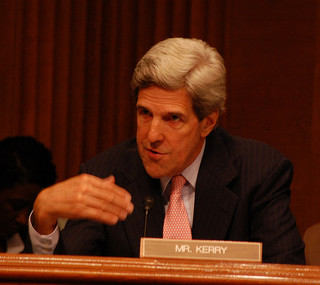5 Important Elements Of Kerry And Lavrov's Syria Talks

The French Draft
Once the plan to place Syria's chemical weapons under international control was endorsed by Russia and Syria, French Foreign Minister Laurent Fabius wrote a draft of a U.N. Security Council Resolution that includes forcing Syria to reveal all the specific details of their chemical weapons program -- something that Bashar al-Assad said Thursday that he is willing to do -- and allowing those weapons to be dismantled. Failure to comply with this would lead to "extremely serious consequences." While the talks between Kerry and Lavrov will not go into every detail, there are major disagreements that need to be worked out.
Resolution or Declaration?
The U.S., U.K., and France want Syria to agree to a full council resolution that would force Syria to follow strict guidelines and allows the U.N. to hold more control over the regime. Russia wants a council declaration, which would be more lenient and give their allies more breathing room. On three previous occasions, Russia has vetoed resolutions on Syria.
SEE ALSO | USC Panel Breaks Down Obama's Speech On Syria
Use Of Force
If the U.S. gets their way and imposes a formal resolution on Syria, then the next debate will concern under which chapter the resolution will be filled. The U.S. wants the resolution to be placed under Chapter VII of the U.N. Charter, which allows for use of force in response to actions that threaten peace. Russia wants any U.N. resolutions to be filed under Chapter VI, which mandates peaceful dispute of settlements. Again, Russia is pushing for more leniency for their Middle East ally.
Vladimir Putin took his case against the use of force straight to the American people on Thursday by writing an op-ed for The New York Times, saying that the U.N. members "must stop using the language of force and return to the path of civilized diplomatic and political settlement."
Is Russia Really Serious About This?
Though Syria's willingness to give up its weapons has given Russia and the U.S. a chance to repair its crumbling relationship, there is still suspicion within the Obama administration over whether Russia is just using these negotiations to stall for time and prevent a military strike for as long as possible. CNN reports that both sides will be bringing experts on chemical weapons to determine if a concrete process for destroying the chemical weapons can be made.
"We can test whether there is a credible and authentic way forward here – that the Russians mean what they say – as importantly, more importantly probably, that Assad means what he says," an official told CNN's Jim Sciutto. U.S. officials are also expected to keep pressure on Syria to make the weapon classification and destruction process as quick and efficient as possible.
The Rebels
And finally, while the U.S., Russia, and Syria move slowly towards an agreement that will avoid a military strike, the rebel forces that have been fighting Assad's regime for the past two years have called out the U.S. for not being strong enough. The Associated Press reports that Salim Idriss, the leader of the Free Syrian Army, said he "categorically rejects" the Russian initiative and calls for the U.N. to put Assad and other top officials on trial before the International Criminal Court.
In addition, human rights groups and Syrian opposition members told USA Today that the U.S. efforts to remove chemical warfare and provide rebel forces with weaponry will not be enough to stop the bloodshed. The shipments sent this week to the rebels only consist of anti-tank missles and light weapons, because the U.S. fears that heavy weapons such as missiles may end up in the hands of Muslim extremist groups also fighting in Syria. FSA commanders say that these weapons have gone to groups fighting the jihadists instead of those fighting regime forces, and it still isn't enough to give them the upper hand.
Members of Human Rights Watch also say that Kerry and Lavrov's talks only address symptoms of greater problems in Syria. Even if government forces are no longer able to use chemical weapons against their own people, Assad's regime will still have many other weapons at his disposal, including incendiary bombs, tank shells, missiles, and torture interrogation. So even if Kerry and Lavrov shake hands on a new plan in the coming weeks, don't expect the stream of atrocities coming out of Damascus to slow anytime soon.
Find more Neon Tommy Syria coverage here.
Reach Executive Producer Jeremy Fuster here or follow him on Twitter



